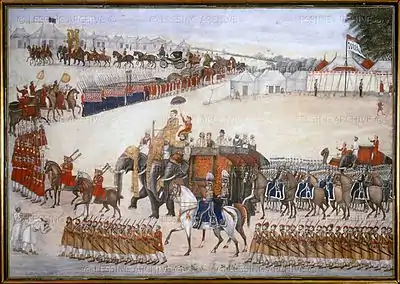Mir Jehandad Khan
Nawab Jehandad Khan Tanoli was a chief of Tanoli tribe in the Hazara region of the North-West Frontier of British India and Nawab of Amb. Jehandad Khan Tanoli was the son of Mir Painda Khan, a fighter against the Sikh Empire. He became the ruler of Amb on the death of his father in 1844.
| Muhammad Jehandad Khan Tanoli | |||||
|---|---|---|---|---|---|
| Nawab of Kingdom of Amb Nawab Shahib Nizam-ul-Mulk | |||||
 | |||||
| 8th Nawab of Kingdom of Amb | |||||
| Reign | 1844 – 1868 | ||||
| Successor | Muhammad Akram Khan | ||||
| Born | 6 February 1820 Amb, Pakistan | ||||
| Died | 11 July 1868 Darband, Khyber Pakhtunkhwa | ||||
| Burial | 1868 | ||||
| |||||
| Dynasty | Tanoli | ||||
| Father | Mir Painda Khan | ||||
| Religion | Sunni Islam | ||||
| Military career | |||||
| Allegiance | British Rule | ||||
| Rank | Nawab | ||||
| Battles/wars |
| ||||
Life
Jehandad Khan was the son of Mir Painda Khan.[1] Jehandad Khan became the ruler of Amb on the death of his father in 1844.
It was said, "Of all the tribal chiefs of Hazara, the most powerful [was] said to be Jehandad Khan of the Tanoli."[2] His territories lay on both banks of the Indus, and Jehandad Khan was highly respected among his peoples as the son of Painda Khan.[2]
In the words of Major J. Abbott
"His (Jehandad's) territory interposes between Hazara and the strongest and most troublesome of the independent tribes. He can send 50 or 60 matchlocks to retaliate a fray which might cost us an army of 8000 men. Jehandad Khan is naturally of a gentle and sincere temperament, and has fewer vicious propensities than most Asiatics."[3]
As far as Jehandad Khan's domain of Upper Tanawal is concerned, with its capital at Amb, the term jagir has never been applicable to it. The British Government considered "Upper Tannowul" as a chiefship held under the British Government, but as a rule they did not possess internal jurisdiction within it. The Chief managed his own people in his own way, without regard to the laws, rules or systems of British India. This tenure resembled that of the Chiefs of Patiala, Jhind, Nabha, Kapurthala, and others.[4]
In 1852, Jehandad Khan was ordered by the President of the Board of Administration, who was visiting Hazara to see him at Haripur about the murder of two British officers, Carne and Tapp of the Salt Department, who had been killed in the country of Jehandad Khan in 1851. When the President ordered the Khan to give up the murderers or else suffer the consequences, the Khan is reported to have replied "We should consider your presence in our kingdom an honour, but our country is a rather difficult one for your army."[5] However, for all his public bravado, the Khan recognised his limitations and in private protested his innocence to the British administrators, and was eventually cleared of the charges.[6] In due course, Mir Jehandad Khan was granted the personal and temporary title of 'Nawab', which in succeeding generations was to be granted to the family in perpetuity.
When he died, the Khan left a nine-year-old son, Muhammad Akram Khan, who succeeded him.[7]
References
- History and pedigree
- Allen 2001, p. 139.
- In a letter dated "Hazara, 7 August 1851", from Major. J. Abbott, Deputy Comm and Supdt, Hazara, to the Secretary to the Board of Administration for the Affairs of the Punjab.
- Letter dated 21 March 1863 from Thomas Douglas Forsyth, Officiating Secretary to the Government of Punjab, to the Secretary to the Government of India, Foreign Department, quoted in A Collection of Papers relating to the History, Status and Powers of The Nawab of Amb, (Punjab Secretariat, 1874), p. 58
- Allen 2001, pp. 203–204
- Allen, pp 203-204
- Hubert Digby Watson (1992). Sarhad Urdu Academy (ed.). Gazetteer of the Hazara District, 1907. p. 20,170,193.